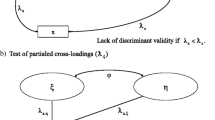Abstract
In the present paper Cohen's and Lee's theory of social conformity and Festinger's theory of cognitive dissonance are first reconstructed according to a revised form of the so-called “structuralist theory-conception” developed by Sneed and Stegmüller with their collaborators. Then the two theories are conceptually correlated in the sense of a technical notion of conceptual correlation which can be shown to be an essential generalization of the theory-relations handled by the structuralists.
It will turn out that there is no unique way to connect these theories with each other. However, it is shown that two ontologically and conceptually different theories can be correlated. This in turn gives in principle an opportunity to compare critically these two theories given that the constructed conceptual correlation is sufficiently sound and that the theories are empirically testable to a sufficient extent.
Similar content being viewed by others
References
Asch, S. E.: 1956, ‘Studies of Independence and Conformity: A Minority of One Against a Unanimous Majority’, Physol. Monogr. 70, No. 9 (Whole No. 416).
Asch, S. E.: 1958, ‘Effects of Group Pressure upon the Modification and Distortion of Judgements’, in Maccoby, Newcomb, Hartley (eds.): 1958 Reading in Social Psychology, 3. ed. New York, pp. 174–183.
Balzer, W. and Sneed, J. D.: 1977, ‘Generalized Net Structures of Empirical Theories I’, Studia Logica 36, 196–211.
Balzer, W. and Sneed, J. D.: 1978, ‘Generalized Net Structures of Empirical Theories II’, Studia Logica 37, 167–194.
Cohen, B.: 1963: Conflict and Conformity A Probability Model and its Application, M.I.T. Press, Cambridge, Mass.
Cohen, B. and Lee, H.: 1972, ‘Social Status and Conformity Behavior’ (presented at the annual meetings of Canadian Sociological and Anthropological Association in Montreal, Canada, Spring 1972).
Cohen, B. and Lee, H.: 1975, Conflict, Conformity and Social Status, Elsevier, Amsterdam, Oxford and New York.
Estes, W. K. and Suppes, P.: 1957, Foundations of Statistical Learning Theory, I: The Linear Model for Simple Learning, Technical Report No. 16, Stanford University.
Estes, W. K. and Suppes, P.: 1959, Foundations of Statistical Learning Theory, II: The Stimulus Sampling Model, Technical Report No. 26, Stanford University.
Festinger, L.: 1957, A Theory of Cognitive Dissonance, Stanford University Press, Standford, California.
Festinger, L.: 1978, Theorie der kognitiven Dissonanz, herausgeben von Martin Irle und Volker Möntman, Verlag Hans Huber, Bern-Stuttgart-Wien.
van Fraassen, B. C.: 1970. ‘On the Extension of Beth's Semantics of Physical Theories’, Philosophy of Science 37, 325–339.
Hintikka, J., Gruender, D., and Agazzi, E. (eds.): 1980, ‘Theory Change, Ancient Axiomatics, and Galileo's Methodology’, Proceedings of the 1978 Pisa Conference on the History and Philosophy of Science, Vol. I, D. Reidel, Dordrecht.
Krajewski, W.: 1977, Correspondence Principle and Growth of Science, D. Reidel, Dordrecht.
Krause, M. S.: 1972, ‘An Analysis of Festinger's Cognitive Dissonance Theory’, Philosophy of Science 39, 33–50.
Kuokkanen, M.:1984a, ‘On Conceptual Correlation’, forthcoming in Erkenntnis.
Kuokkanen, M.: 1984b, ‘On Philosophical and Methodological Problems of Commensurability and Incommensurability in Mathematical Social Theorizing’, forthcoming in Proceedings of Second International Symposium on the Methodology of Mathematical Modelling, Varna, Bulgaria,, 10–15 June, 1984.
Kuokkanen, M.: 1985, ‘Social Norms and Learning Theories’, Quality and Quantity 19, 279–291.
Lee, H.: 1972, ‘Obstacles to the Accumulation of Knowledge in the Social Sciences’, Synthese 24, 431–438.
Lindzey, G. and Aronson, E. (eds.): 1968, Handbook of Social Psychology, Vol. I, Sec. Ed., Addison Wesley, Readings, Massachusetts.
Niiniluoto, I.: 1980, ‘The Growth of Theories: Comments on the Structuralist Approach’, in Hintikka, Gruender and Agazzi (1980), pp. 3–46.
Niiniluoto, I. and Tuomela, R. (eds.): 1979, The Logic and Epistemology of Scientific Change, Acta Philosophica Fennica, 30/2–4.
Nowak, L.: 1975a, ‘Idealization: A Reconstruction of Marx' Ideas’, Poznan Studies in the Philosophy of the Sciences and the Humanities, Vol. I, No. 1.
Nowak, L.: 1975b, ‘Idealization and the Problem of Correspondence’, Poznan Studies in the Philosophy of the Sciences and the Humanities, Vol. I, No. 1.
Pearce, D.: 1981, ‘Is There Any Theoretical Justification for a Nonstatement View of Theories’, Synthese 46, 1–39.
Pearce, D. and Rantala, V.: 1983, ‘New Foundations for Metascience’, Synthese 56, 1–26.
Przełecki, M.: 1974, ‘A Set Theoretic Versus a Model Theoretic Approach to the Logical Structure of Physical Theories; Some Comments on J. Sneed's The Logical Structure of Math. Physics’, Studia Logica 33, 91–112.
Przełecki, M., Szaniawski, K., and Wójcicki, R. (eds.): 1976, Formal Methods in the Methodology of Empirical Sciences, Ossoleum, Wroclaw-Warsawa-Krakow-Gdansk.
Rantala, V.: 1978, ‘The Old and the New Logic of Metascience’, Synthese 39, 233–247.
Restle, and Greeno: 1970, Introduction to Mathematical Psychology, Addison-Wesley Publishing Company.
Secord, P. F. and Backman, C. W.: 1964, Social Psychology, McGraw-Hill Company.
Tuomela, R.: 1973, Theoretical Concepts, Springer-Verlag, Wien-New York.
Tuomela, R.: 1978, ‘On the Structuralist Approach to the Dynamics of Theories’, Synthese 39, 211–231.
Tuomela, R.: 1979a, ‘Scientific Change and Approximation’, in Niiniluoto and Tuomela (1979), pp. 265–297.
Tuomela, R.: 1979b, ‘Scientific Change in Social Science: A Case Study of Cohen's and Lee's Theories of Conformity’, unpublished working paper.
Wójcicki, R.: 1976, ‘Some Problems of Formal Methodology of Science’, in Przelecki, Szaniawski and Wójcicki (1976), pp. 9–18.
Wójcicki, R.: 1979, Topics in the Formal Methodology of Empirical Sciences, D. Reidel, Dordrecht-Holland/Boston-U.S.A./Wroclaw-Poland.
Zajonc, R. B.: 1968, ‘Cognitive Theories in Social Psychology’, in Lindzey and Aronson (1968), pp. 320–411.
Author information
Authors and Affiliations
Rights and permissions
About this article
Cite this article
Kuokkanen, M. Conceptual correlation: An example of two social psychological theories. Theor Decis 20, 1–32 (1986). https://doi.org/10.1007/BF00133633
Issue Date:
DOI: https://doi.org/10.1007/BF00133633




